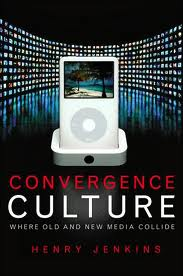Henry Jenkins describes his conception of convergence culture, the by-product of the collision between new and old media, along with the implications of convergence culture for education.

In the world of media convergence, every important story gets told, every brand gets sold, and every consumer gets courted across multiple media platforms. This circulation of media content—across different media systems, competing media economies, and national borders—depends heavily on consumers’ active participation. I will argue here against the idea that convergence should be understood primarily as a technological process bringing together multiple media functions within the same devices. Instead, convergence represents a cultural shift as consumers are encouraged to seek out new information and make connections among dispersed media content. [It] is about the work—and play—spectators perform in the new media system.
The term ‘participatory culture’ contrasts with older notions of passive media spectatorship. Rather than talking about media producers and consumers as occupying separate roles, we might now see them as participants who interact with each other according to a new set of rules that none of us fully understands. Not all participants are created equal. Corporations—and even individuals within corporate media—still exert greater power than any individual consumer or even the aggregate of consumers. And some consumers have greater abilities to participate in this emerging culture than others.
Convergence does not occur through media appliances, however sophisticated they may become. Convergence occurs within the brains of individual consumers and through their social interactions with others. Each of us constructs our own personal mythology from bits and fragments of information extracted from the media flow and transformed into resources through which we make sense of our everyday lives. Because there is more information on any given topic than anyone can store in their head, there is an added incentive for us to talk among ourselves about the media we consume. This conversation creates buzz that is increasingly valued by the media industry. Consumption has become a collective process—and that’s what [I mean] by collective intelligence, a term coined by French cybertheorist Pierre Levy. None of us can know everything; each of us knows something; and we can put the pieces together if we pool our resources and combine our skills. Collective intelligence can be seen as an alternative source of media power. We are learning how to use that power through our day-to-day interactions within convergence culture. [C]ollective meaning-making within popular culture is starting to change the ways religion, education, law, politics, advertising, and even the military operate. …
Convergence doesn’t just involve commercially produced materials and services traveling along well-regulated and predictable circuits. It also occurs when people take media in their own hands. Entertainment content isn’t the only thing that flows across multiple media platforms. Our lives, relationships, memories, fantasies, desires also flow across media channels.
Intoxicated students at a local high school use their cell phones spontaneously to produce their own soft-core porn movie involving topless cheerleaders making out in the locker room. Within hours, the movie is circulating across the school, being downloaded by students and teachers alike and watched between classes on personal media devices. When people take media into their own hands, the results can be wonderfully creative; they can also be bad news for all involved.
The American media environment is now being shaped by two seemingly contradictory trends: on the one hand, new media technologies have lowered production and distribution costs, expanded the range of available delivery channels, and enabled consumers archive, annotate, appropriate, and recirculate media content in powerful new ways. At the same time, there has been an alarming concentration of the ownership of mainstream commercial media, with a small handful of multinational media conglomerates dominating all sectors of the entertainment industry. No one seems capable of describing both sets of changes at the same time, let alone show how they impact each other. Some fear that media is out of control, others that it is too controlled. Some see a world without gatekeepers, others a world where gatekeepers have unprecedented power. Again the truth lies somewhere in between. …
Historically, public education in the United States was a product of the need to distribute the skills and knowledge necessary to train informed citizens. … The ideal of the informed citizen is breaking down because there is simply too much for any individual to know. The ideal of monitorial citizenship depends on developing new skills in collaboration and a new ethic of knowledge sharing that will allow us to deliberate together.
Right now, people are learning how to participate in such knowledge cultures outside of any formal educational setting. Much of this learning takes place in the affinity spaces that are emerging around population culture. … Many schools remain openly hostile to these kinds of experiences, continuing to promote autonomous problem solvers and self-contained learners. … We need to rethink the goals of media education so that young people can come to think of themselves as cultural producers and participants and not simply as consumers, critical or otherwise.
Welcome to convergence culture, where old and new media collide, where grassroots and corporate media intersect, where the power of the media producer and the power of the media consumer interact in unpredictable ways. Convergence culture is the future, but it is taking shape now.
Jenkins, Henry. Convergence Culture: Where Old and New Media Collide. New York: New York University Press, 2006, pp. 2-4, 17-18, 258-260. || Amazon || WorldCat
Previous || Chapter 1: Directory || Next
